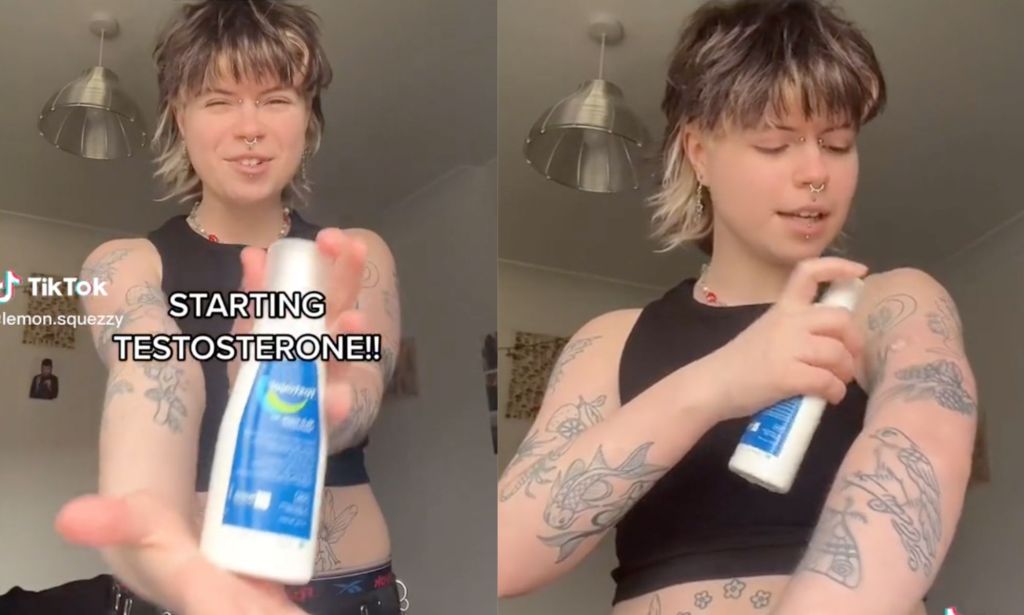Trans TikTok sensation does all the things you’re scared of ‘to show you it’s OK’

(Ezra Butler)
(Ezra Butler)
There’s no step-by-step programme on how to do the stuff you’re scared to do, but one TikToker is showing that it’s OK to take that leap – whether it’s trying a fear food, coming out or spreading trans joy.
Scroll through LGBTQ+ TikTok, and you might see Ezra Butler — handle @lemon.squeezy — talking about how it gives him a warm, bubbly feeling when his identity is affirmed by others.
Next, you might be recommended a video of Ezra taking you along with him to his GP to ask for testosterone, with the caption: “Doing things you’re afraid of to show you it’s OK!”
Scroll a bit more, and there’s a ‘get ready with me’ video of Ezra spreading testosterone gel on his abdomen, dancing with joy while waiting for it to dry, or a clip of him smiling with bright, colourful make-up painted on his cheeks as he talks about celebrating queer joy and how he came out as bisexual.
Ezra’s journey on TikTok, where has over 1.4 million followers, was born out of his own eating disorder recovery.
“It started off with eating disorder recovery videos where I was eating my fear foods, and that became less of an issue so I started doing other people’s foods and then I broadened out to just fears in general,” he tells PinkNews. “Then in this time, I came out so then I started making videos on queer joy and just talking about it and stuff.”
Soon, he realised his videos were encouraging others to overcome their fears and dare to do what they believed impossible.
Social media has long been a place of support and refuge for LGBTQ+ people, especially trans youth.
There’s incredible value for LGBTQ+ youth in finding even a single person who can support and affirm them, whether that’s online or in their physical community.
Almost half (45 per cent) of American LGBTQ+ youth seriously considered suicide in the past year, according to The Trevor Project’s 2022 National Survey on LGBTQ Youth Mental Health. Nearly one in five trans and non-binary youth attempted suicide.
The Trevor Project found that support and affirmation can have an immensely positive impact on the mental health of queer kids. Some sources of joy that LGBTQ+ young people listed in the survey included: family and parental support, online communities and support, learning LGBTQ+ history and “learning I’m not alone and there are more people like me”.

Ezra says it’s been especially moving to see the impact his videos — whether they’re educational, glimpses into his life or those filled with trans joy — have had on queer youth on TikTok.
“I do really like sharing it because I’m able to show young, queer kids that it is fine and it’s going to be OK,” he says.
He’s also glad to show people figuring out their gender in their 20s or later that it’s perfectly fine to go at your own pace.
“They can see someone in their 20s, who figures it out in their 20s, go and do these things and say they want to get top surgery and start healing and stuff like that. And I think that sometimes people are worried that if they don’t have these thoughts when they’re like literally a child, then it means that they can’t transition when they can.”
Ezra wants people to know it’s “OK to be wrong” and to feel like they can grow up while discovering new aspects of their identity.
“I went through a whole thing with pronouns where I tried them all out,” he says. “So I was like she/her, she/they, I did all pronouns because I really liked he pronouns but I was a bit too nervous and I came out every single time with these pronouns.
“I think one thing that I guess I get grated for online is the switch up, and it’s like it takes time. It’s OK that it takes time.
“Then I went from they/he to he/they, and finally found somewhere that I feel comfortable sticking with, which is he/him.
“But it takes time, and I think that a lot of people can feel pressure to get it right straightaway.”
Suicide is preventable. Readers who are affected by the issues raised in this story are encouraged to contact Samaritans on 116 123 (www.samaritans.org), or Mind on 0300 123 3393 (www.mind.org.uk). Readers in the US are encouraged to contact the National Suicide Prevention Line on 1-800-273-8255.

